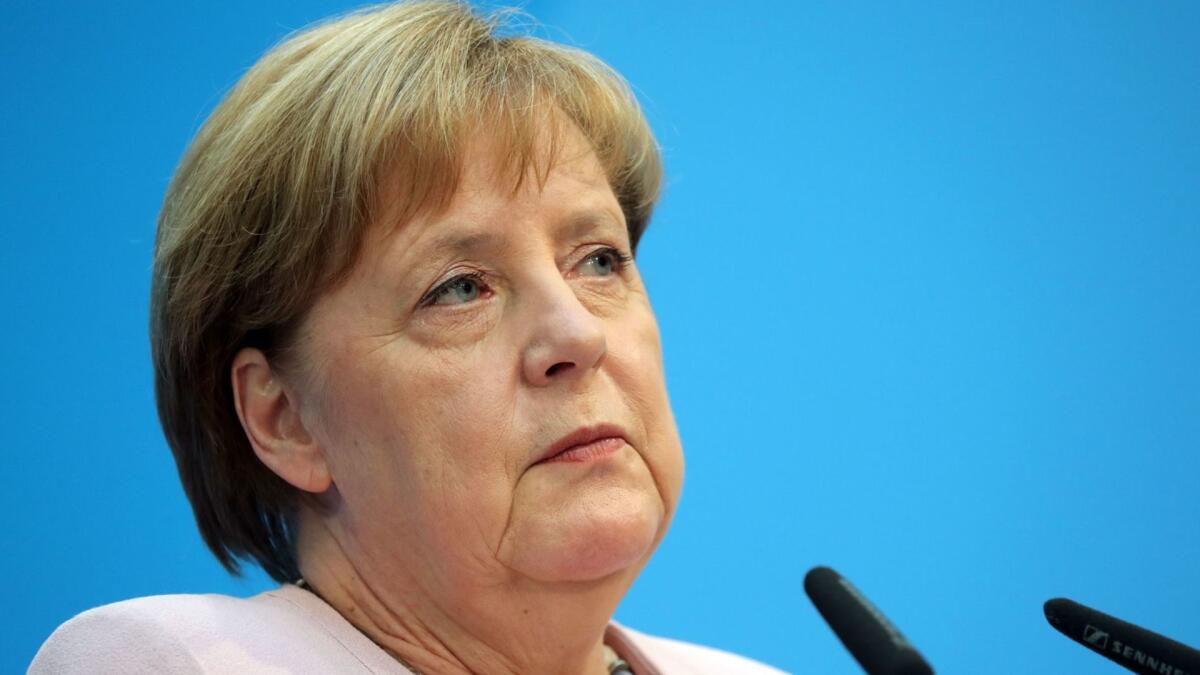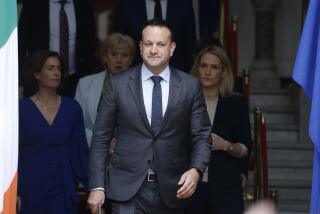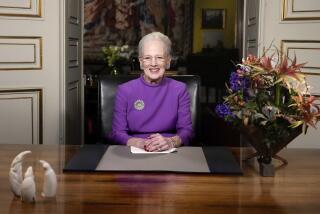Merkel faces political turmoil in Germany as Social Democrats’ leader steps down

German Chancellor Angela Merkel’s grand coalition government was plunged into turmoil Sunday when the leader of the Social Democrats resigned abruptly under pressure after her center-left party suffered a humiliating defeat in last week’s European Parliament elections.
Andrea Nahles, the first woman to head Germany’s oldest party, announced she would quit as party chairwoman, parliamentary floor leader and even give up her seat in the German Parliament after her attempt to snuff out a brewing rebellion over the party’s frightening slide backfired.
She had planned to ask her party members in Germany’s Parliament for a vote of confidence Tuesday, but it emerged over the weekend that she would most probably lose the vote.
“Talks within the parliamentary group and feedback from within the party itself have shown me that I no longer have the necessary support to carry out my duties,” Nahles said a terse statement. “I want to clear the path so that successors for both positions can be found in an orderly fashion. I hope you will all stick together and act prudently.”
Merkel, a leader of the conservative Christian Democrats who was elected to a fourth four-year term in 2017 with the reluctant support of Nahles’ Social Democrats, does not usually comment on internal party changes. But because the upheaval in her coalition partners, a party that stood up to the Nazis and traces its roots to 1863, is causing tremors that could bring down her government and put an early end to her career, the chancellor appeared before reporters on Sunday evening.
Merkel has already announced she would not seek a fifth term after her current term expires in 2021.
“I would like to express my respect for Andrea Nahles and her decision,” Merkel said. “Despite all that, I would like to take this opportunity to say that this government will continue its work with all earnestness and, above all, with a high degree of responsibility.”
She added there were burning issues on the table that need to be resolved within Germany and across Europe. “And in this spirit we will continue working on them.”
Merkel nevertheless now faces the specter of new elections well before the next scheduled balloting in 2021; many Social Democrats have been clamoring for the center-left party to regroup in the opposition after watching its support crumble as the underappreciated junior partner. Social Democratic parties have struggled in several leading European nations in recent years, especially France and Italy.
Merkel’s conservative party, with 246 seats in Parliament, does not have enough seats in the 709-seat Bundestag to rule on its own and has relied on the 152 seats held by the Social Democrats to form a majority with 398 seats in total. There are no other coalition alliances on the horizon, although Merkel, 64, could try to continue on with a minority government — even though pollsters say risk-averse Germans are opposed to such an unstable government.
“With Nahles out, it becomes more likely that the [Social Democrats] will leave Merkel’s grand coalition, potentially clearing the path for a new election,” said Julius van de Laar, an independent political analyst in Berlin.
“With all the international turbulence going on around her, Merkel was hoping for some stability at least in her own government,” he said. “Even though Merkel and Nahles didn’t see eye to eye on some issues, Merkel has had a reliable partner in Nahles. That will most certainly change, regardless of whomever the SPD selects as its new leader.”
Nahles, 48, took control of the party a year ago when it was still reeling from the shock of its historic poor showing of 20.5% of the vote in the 2017 elections. The rudderless Social Democrats fell even further in the May 26 European parliamentary elections to 15.8% — an especially bitter debacle because it represented a third-place finish in a nationwide election for the first time behind Merkel’s conservatives (28.9%) and the center-left Greens party (20.5%).
The Social Democrats have helped shape the country with a brand of socialism mixed with capitalism they call “social market economy.”
The party has elected three postwar chancellors: Willy Brandt, Helmut Schmidt and Gerhard Schroeder. But its hopes of leading another German government have faded in the last year.
The Forsa polling institute reported Sunday that the Greens had for the first time topped its weekly poll, with the conservatives second and Social Democrats third at 12%.
“The alliance between the conservatives and Social Democrats is now finished,” wrote Detlef Esslinger in a commentary for the Sueddeutsche Zeitung newspaper’s online edition. “There was hardly any common ground to be found between the two parties and they were simply going through the motions. Does anyone seriously hope this will continue for another two years? Andrea lost her nerves in Germany and now the government that never really worked anyhow is about to fall apart.”
Far-right parties and Greens gain ground in European Parliament election »
More to Read
Start your day right
Sign up for Essential California for news, features and recommendations from the L.A. Times and beyond in your inbox six days a week.
You may occasionally receive promotional content from the Los Angeles Times.






